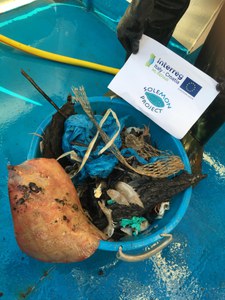The Adriatic fishermen are ready to clean the sea from the plastic
The Adriatic is one of the areas with the highest density of waste, floating and at the bottom of the sea and on the beaches (Marine litter assessment in the Adriatic & Ionians seas). A solution to reduce the problem seems to be available: to allow fishermen to bring back the waste they are fishing random or accidentally. This practice is called Fishing for Litter, born in Scotland in 2005, and aims to clean the sea with fishermen support. In the article just published in the Marine Policy magazine entitled "Fishing for Litter in the Adriatic-Ionian macroregion (Mediterranean Sea): strengths, weaknesses, opportunities and threats", the authors examined the strengths and difficulties encountered in the involvement of fishermen in cleaning the sea in the countries surrounding the Adriatic. In fact, between 2014 and 2016, 124 vessels located in 15 ports between Italy, Slovenia, Croatia, Montenegro and Greece removed 122 tonnes of waste, mainly plastic, from the sea, thanks to the implementation of pilot projects for Fishing for Litter of the DeFishGear European project, which ISPRA was a partner.
The survey showed that the fishermen are ready to make their contribution to clean the sea, "it is clear that the fishermen want to contribute to clean sea, but there is a regulatory gap not only in Italy but also in other countries that facing the Adriatic: there is a issue on how to classify the waste caught in the sea, whether it is an urban or special waste " said Fortibuoni, ISPRA researcher.
The cleaning of the sea is therefore only postponed, and in the meantime a recent European project called ML-REPAIR, in which ISPRA participates, has allowed to resume the activity of Fishing for Litter in the Adriatic, thanks to the collaboration between Italy and Croatia. The activities are carried out in 5 Italian ports and 9 Croatian ports, for a total of 61 vessels involved in cleaning the Adriatic Sea.

